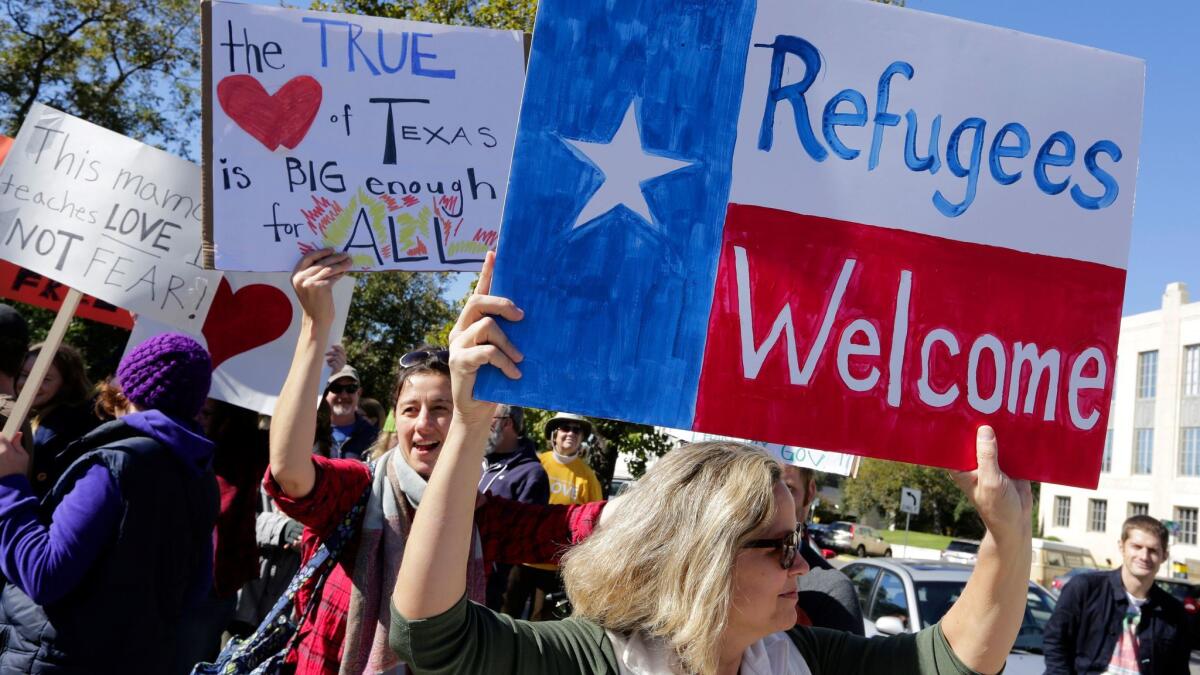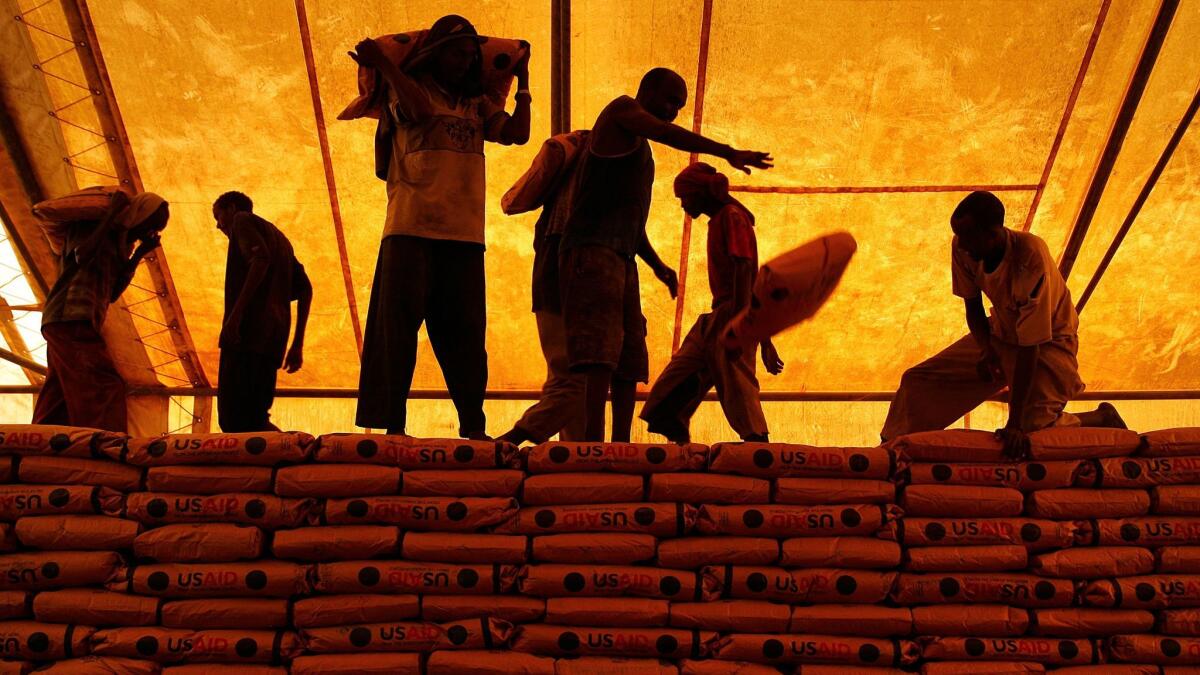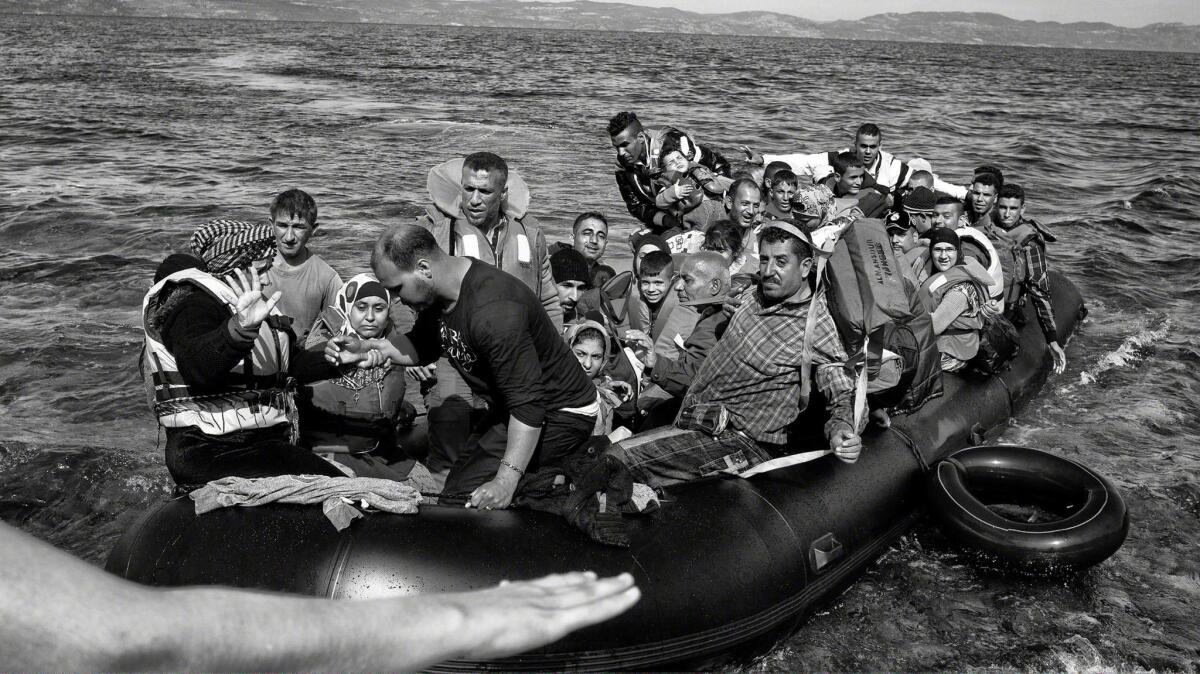What Trump’s presidency could mean for refugees, foreign aid and women’s rights abroad

- Share via
Over the last eight years, the Obama administration elevated engagement in global development as “a key pillar of American foreign policy.”
“If you care about human dignity,” Obama said at this summer’s White House Summit on Global Development, “if you care about reducing violence and terrorism, if you care about fighting climate change, if you care about addressing inequality and creating trade and prosperity that works for all and not just some, then you’re going to have to pay attention to development and you’re going to have to make an investment.”
With the election of Donald Trump, those priorities seem set to shift.
Some development experts hope a Trump administration will continue the Republican tradition of promoting foreign assistance as a means to promote global health, democracy and economic growth around the world.
“President George W. Bush had no record of being pro-Africa or pro-foreign assistance and he left an absolutely stellar record,” said Todd Moss, chief operating officer and senior fellow at the Center for Global Development, who served in the State Department during the Bush administration.
“We have a long tradition of American leadership on national security, and development is a foundation for all of the human progress we’ve seen over the last half-century,” Moss said. “There are obviously disputes over what’s the best way to do that and we will soon see what ideas are to come out of [Trump’s] administration. It’s too early to say anything with certainty.”
But the president-elect’s initial choices and the uncertainty over the makeup of his Cabinet are rattling some development professionals.
Trump has so far made his pick for three key posts: Sen. Jeff Sessions (R-Ala.) for attorney general, Michael Flynn for national security advisor and Rep. Mike Pompeo (R-Kan.) for CIA director.
Sessions, a former U.S. attorney, has vowed to crack down on illegal immigration and has been criticized in the past for making racist comments. Flynn has called Islam a “cancer” and a “political ideology” masquerading as a religion. Pompeo, a businessman turned politician, shares Trump’s views on issues such as using controversial tactics for interrogation and pulling the plug on the landmark Iran nuclear agreement.
Many in the global development community are now concerned about what lies ahead for everything from refugee resettlement and women’s reproductive rights to foreign aid, and U.S. efforts to combat poverty, hunger and disease worldwide.
Foreign aid
Trump said very little about his foreign aid policy during the campaign, but did promise not to partake in nation-building and insisted during his presidential announcement that “it is necessary that we invest in our infrastructure and stop sending aid to countries that hate us.”

“Given what [Trump] said on the campaign trial about the need for our closest allies to pay their fair share, I don’t think it bodes well for foreign aid in general, and certainly not for development aid,” said Kal Raustiala, professor of law and director of the Burkle Center for International Relations at UCLA. “We might anticipate some more radical changes. His rhetoric has not been promising.”
U.S. foreign aid, which is currently less than 1% of the federal budget, has gone toward helping lift millions of people out of poverty, according to officials at the U.S. Agency for International Development. U.S.-sponsored programs are helping to boost the income of small-scale farmers in developing nations, improve the nutrition of women and children, and fight malaria and HIV/Aids.
Raustiala said continuing to help those in need is not just important for the humanitarian and moral reasons that have been held as a core aspect of U.S. foreign policy. It is also important for protecting U.S. interests and leadership on the world stage.
“If the U.S. is not an actively engaged member of the international community and assisting many countries with their development, somebody else will — and maybe in ways that are much less positive for us,” he said. “American engagement in the world is not about doing the world a favor. It’s been about securing our place and leadership in the world and engaging to ensure that a stable, liberal, rules-based order can persist, which is to everyone’s benefit.”
Refugee resettlement
During the presidential campaign, Trump said he wants to stop taking in refugees fleeing violence in Syria and called for “total and complete shutdown of Muslims entering the United States.” He later adjusted, saying he would consider allowing Muslims as long as they were “vetted strongly,” but the call for shutting out Muslims remains on his campaign website.
The U.S. is currently the world’s top resettlement country for refugees, and the Obama administration announced this year that it wants to increase the refugee intake next year to 110,000, up from 85,000.

Bipartisan legislation supporting refugees has recently been introduced to Congress, including the Middle East Refugee Emergency Supplemental Appropriations Act that would provide an additional $1 billion in emergency funding for refugee protection, screening and resettlement. But advocates for refugees fear that such cooperation could end under Trump.
“We’re alarmed, because what’s going to happen for sure is that the system is going to be shaken up and the status quo will no longer be relevant,” said Neil Grungras, founder and executive director of the San Franscico-based Organization for Refuge, Asylum & Migration, a nonprofit dedicated to protecting the world’s most vulnerable refugees. “The worst fear of the refugee community is that the Trump presidency will just stop the refugee program.”
Speaking from Ankara, Turkey, where his agency helps refugees present their cases for resettlement to the United Nations high commissioner for refugees, Grungras said the anxiety was palpable.
“The refugees that are obviously at the end of the gun are Muslims,” Grungras said. “The level of desperation is indescribable for everybody. But LGBT refugees could also be enormously hard hit.”
The U.S. funds more than half of UNHCR’s operations, and Trump has attacked the level of the U.S. contribution to the U.N.
“In a worst-case scenario … if the UNHCR is weakened and cannot process refugees, if it’s defunded, that mainstay of refugee protection is going to be harmed — and it may be very severely,” Grungras said. The 65-year-old agency works to ensure that people fleeing violence, persecution, war or disaster at home have the right to find safe refuge and seek asylum. It provides shelter and supplies for the displaced and processes applications for resettlement, among other responsibilities.
Volunteer agencies that manage refugee resettlement in the U.S. also depend on government funding and could be forced to lay off staff if resources are cut. This could disrupt the processing of refugees already flowing through the resettlement pipeline, refugee advocates said.
Women and gender issues
“Women around the world are alarmed,” said Francoise Girard, president of the International Women’s Health Coalition. “We’ve received many messages from all over the world following the election, expressing sadness, expressing shock, expressing anxiety and concern about the direction the U.S. government will take under a Trump administration.”

During the campaign, Trump promised to appoint Supreme Court justices who could potentially overturn federal legislation affirming a woman’s right to have an abortion. Such a move at home could have harmful reverberations worldwide, advocates said.
“The United States is of course a very important and influential country in global diplomacy,” Girard said. “It has also historically set the pace on women’s rights. What we’re afraid of [is] a regression on women’s sexual, reproductive and health rights.”
U.S. funding for programs such as the distribution of contraceptives in developing nations might also be at risk, and some rights advocates expect a renewed emphasis on abstinence until marriage as a method of HIV prevention, Girard said.
Women’s rights took center stage during negotiations over the U.N.’s global development goals, and that, said Girard, “was an extraordinary experience.”
“Now to see that that can go away so quickly, it’s devastating,” she said.
Justice and human rights
Trump’s proposals to build a wall along the U.S. border with Mexico, deport millions of immigrants in the country illegally, possibly ban Muslims — and to potentially reintroduce the use of torture methods, such as waterboarding, during interrogations — have drawn widespread condemnation.
Human rights activists warned that promoting xenophobia, sexism and discrimination at home could embolden governments that the U.S. has criticized for such behavior to expand these practices, and they have called on Trump to reaffirm and abide by the principles the U.S. has up to this point promoted worldwide.
“From internment camps to the use of torture, we have seen disastrous results when those we elect to represent us flout the United States’ obligations to uphold human rights,” Margaret Huang, executive director of Amnesty International USA, said in a statement.
For more on global development news, see our Global Development Watch page, and follow me @AMSimmons1 on Twitter
ALSO
Climate report card: hot, wild and with an increasingly visible ‘human footprint’
Despite Trump’s skepticism, nearly 200 countries pledge to keep fighting climate change
By drawing 50 ‘states’ according to income, study reveals ‘developing countries’ within the U.S.
More to Read
Sign up for Essential California
The most important California stories and recommendations in your inbox every morning.
You may occasionally receive promotional content from the Los Angeles Times.











